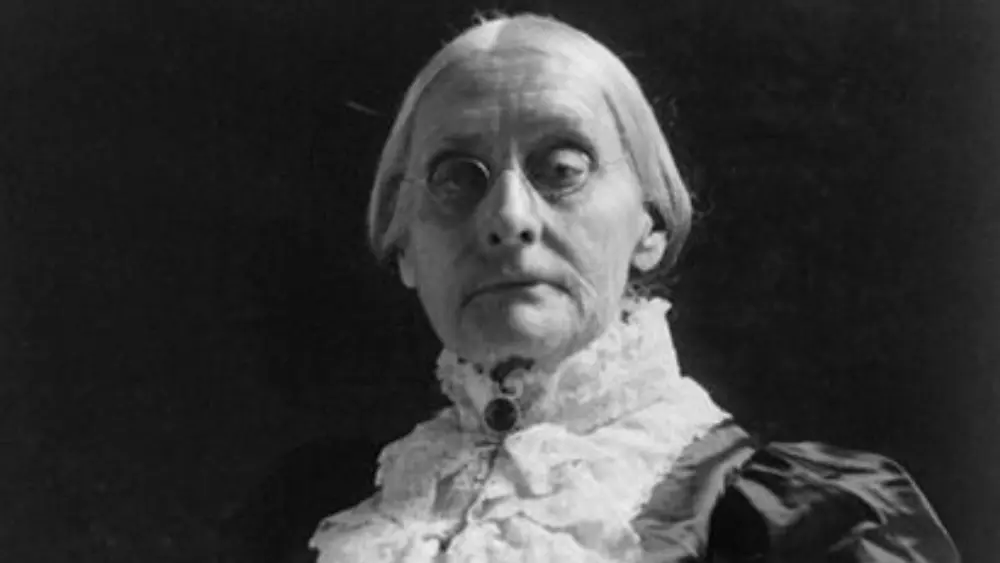Susan Brownell Anthony, born on February 15, 1820, in Adams, Massachusetts, was a pioneering American activist who dedicated her life to the fight for women’s rights. As a passionate suffragist, abolitionist, and reformer, she dedicated her life to fighting for women’s rights and social justice, leaving a powerful and lasting legacy in the ongoing journey toward gender equality.
Susan B. Anthony: Early Life and Education
Susan B. Anthony’s youth was molded by her Quaker family’s emphasis on education and social justice, shaping her deeply. Her father, Daniel Anthony, nurtured her intellect and independence, fostering the fertile soil from which her future activism would bloom. From a young age, Susan was instilled with the belief that education was a pathway to empowerment and change.
Susan B. Anthony pursued her education at Deborah Moulson’s Female Seminary, a renowned Quaker boarding school for young women, offering enlightenment. This educational environment not only enriched her knowledge but also reinforced her commitment to the principles of equality and justice. In the Quaker community, Anthony’s beliefs crystallized, laying the foundation for her lifelong commitment to women’s rights and social reform.
Early Activism: Abolition and Temperance
During the 1830s and 1840s, Susan B. Anthony emerged as a dedicated and active participant in two significant social reform movements of the era: abolitionism and temperance. In a time of intense social upheaval, she passionately embraced the causes of both ending slavery and advocating for temperance.
Within the abolitionist movement, Anthony aligned herself with organizations and individuals who were fervently committed to the eradication of slavery. Her involvement in this cause exposed her to the injustices of the day and deepened her commitment to social reform. Simultaneously, Anthony joined the temperance movement, which aimed to curb the consumption of alcohol. Her involvement in these movements laid the groundwork for her future activism and dedication to women’s and marginalized groups’ rights. Susan B. Anthony’s early experiences in these movements would ultimately shape her legacy as a tireless champion of equality and justice.
Susan B. Anthony: Women’s Rights Advocacy Begins
Susan B. Anthony’s trailblazing women’s rights journey shifted in the 1850s when she met visionary activist Elizabeth Cady Stanton. Their collaboration was a pivotal moment in history, as together, they orchestrated the groundbreaking Seneca Falls Convention in 1848. This historic event inaugurated the first U.S. women’s rights convention, a potent platform for advocating women’s suffrage and gender equality.
At the Seneca Falls Convention, Susan B. Anthony and Elizabeth Cady Stanton penned the revolutionary “Declaration of Sentiments,” which mirrored the structure of the Declaration of Independence. This document declared individuals equal, affirming women’s demand for fundamental rights, including the right to vote. Seneca Falls Convention and the “Declaration of Sentiments” ignited the modern women’s suffrage movement, shaping a legacy for gender equality. Susan B. Anthony’s early role showcased her steadfast commitment to women’s rights and lasting impact on the gender equality struggle.
Lifelong Partnership with Elizabeth Cady Stanton
The enduring partnership between Susan B. Anthony and Elizabeth Cady Stanton stands as a cornerstone of the women’s suffrage movement in the United States. Together, they formed an indomitable duo whose collaboration reshaped the landscape of gender equality advocacy. Their partnership yielded numerous publications, fervent speeches, and tireless activism, all dedicated to furthering women’s rights.
Anthony and Stanton’s dynamic collaboration extended beyond mere intellectual synergy; they were comrades on the frontlines of the movement. Together, they traversed the nation, rallying support for women’s suffrage through public lectures, conventions, and lobbying efforts. Their steadfast dedication to the cause, coupled with their ability to reach broad audiences, played a pivotal role in mobilizing a diverse range of activists and supporters. The lifelong partnership between Susan B. Anthony and Elizabeth Cady Stanton was a driving force behind the women’s suffrage movement, a testament to the power of friendship and shared convictions in the pursuit of justice and equality.
Susan B. Anthony: Women’s Loyal National League and the Civil War
Amid the tumultuous backdrop of the Civil War, Susan B. Anthony and Elizabeth Cady Stanton continued their tireless advocacy for justice and equality. Together, they founded the Women’s Loyal National League, an organization with a singular mission: to champion the abolition of slavery. While the Civil War raged on, Anthony and Stanton recognized the historical significance of this moment and seized it as an opportunity to advance the causes they held dear.
Susan B. Anthony, in particular, saw the conflict as more than just a struggle to end slavery; she viewed it as a chance to further the rights of women and push for suffrage. Her visionary perspective on the intersection of women’s rights and the broader struggle for equality helped set the stage for future battles in the ongoing fight for gender parity. The Women’s Loyal National League’s commitment to abolition and the innovative thinking of its leaders, including Susan B. Anthony, represented a pivotal moment in the history of social reform in the United States, marking the convergence of two profound movements for justice and liberty.
Suffrage Advocacy and Constitutional Amendment
Susan B. Anthony’s commitment to the cause of women’s suffrage spanned decades, cementing her legacy as one of the foremost leaders of the movement. Her dedication knew no bounds as she crisscrossed the nation, speaking at suffrage conventions, tirelessly lobbying members of Congress, and engaging with state legislatures in a relentless pursuit of voting rights for women. Anthony’s eloquence and passion for justice resonated with audiences far and wide, galvanizing support for the suffrage cause.
One of the most pivotal moments in Susan B. Anthony’s suffrage advocacy came with her involvement in the drafting and promotion of the 19th Amendment to the United States Constitution. This amendment, commonly known as the Women’s Suffrage Amendment, sought to grant women the right to vote. Although Anthony did not live to witness its ratification in 1920, her tireless efforts laid the foundation for the eventual triumph of the women’s suffrage movement. Her life’s work, marked by unyielding dedication and an unshakeable belief in equality, stands as an enduring testament to the power of activism and the progress that can be achieved through relentless determination.
Susan B. Anthony: Voting and Legal Battles
In a bold and historic act of defiance, Susan B. Anthony made a resounding statement for women’s suffrage in 1872 by attempting to cast her vote in the presidential election. At the time, women were denied this fundamental right under the law. Her audacious act challenged the status quo and sparked a legal battle that would go down in history. Anthony’s courage and determination led to her arrest and subsequent trial, which drew significant attention to the suffrage cause.
Despite the legal consequences, Susan B. Anthony’s commitment to the cause remained unwavering. As a powerful form of protest, she refused to pay the fine imposed upon her, emphasizing the injustice of denying women their right to vote. This act of civil disobedience, along with her tireless advocacy, played a crucial role in propelling the suffrage movement forward and bringing the issue of women’s voting rights to the forefront of public consciousness. Susan B. Anthony’s courage to stand up to the system and her willingness to sacrifice her own comfort for the sake of equality helped pave the way for women’s right to vote in the United States, leaving a powerful and lasting impact on the movement.

Legacy and Women’s Suffrage Victory
Susan B. Anthony’s life was one of enduring dedication to the cause of women’s suffrage, and her legacy is forever intertwined with the triumphant moment in 1920 when the 19th Amendment to the U.S. Constitution was ratified, finally granting women the right to vote. Although she did not live to witness this watershed moment, her tireless activism and unwavering commitment laid the very foundation upon which the suffrage movement was built.
Anthony’s contributions to the suffrage cause extended far beyond her lifetime. Her work inspired generations of suffragists who carried the torch forward, and her legacy remains a beacon of hope and inspiration for advocates of equality and justice. The passage of the 19th Amendment was a historic milestone in the journey toward gender equality, and Susan B. Anthony’s enduring influence and tireless efforts continue to be celebrated as a testament to the power of activism and the indomitable spirit of those who refuse to be silenced in the pursuit of justice and equal rights.





Anna Harris, Relationship Enthusiast – Los Angeles, CA. “The Beautiful Lesson from the Ugly Woman” offers a cutting-edge approach to partnerships. Joseph Collins Jr. transforms the concept of togetherness, demonstrating how women can become the driving force behind their partner’s success. This manual contains useful suggestions and genuine advice that speaks to women around the world. The author’s message is evident: women hold the power to motivate and encourage their partners, and in doing so, they can achieve remarkable success together. This is essential reading for any woman who aims to build a strong relationship.”